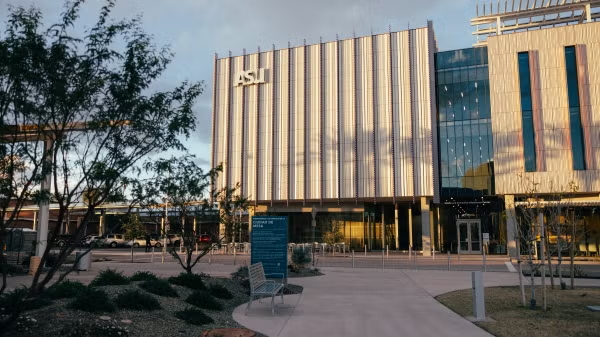ASU's new Center for Public Humanities names scholar Elisa New as director

Elisa New, a scholar of classic American literature and poetry, has been named the first-ever director of the Center for Public Humanities in The College of Liberal Arts and Sciences. Photo courtesy of Rose Lincoln, Harvard University.
This fall, the humanities division at Arizona State University will welcome scholar Elisa New as the first-ever director of the Center for Public Humanities in The College of Liberal Arts and Sciences. The new center will join the division's 11 existing centers, with the goal of bringing the best of humanities teaching and learning to worldwide public audiences.
New, a scholar of classic American literature and poetry, was a professor at the University of Pennsylvania from 1989 to 1999. Since 1999, she has served as the Powell M. Cabot Professor of American Literature at Harvard University.
In line with her personal mission to bring humanities content to broader audiences, she established a nonprofit educational media production company that produces a nationally airing PBS series called “Poetry in America,” a multiplatform educational initiative that brings poetry into classrooms and living rooms around the world. The show, now going into its third season and filming for a fourth, is supported by the National Endowment for the Humanities and will function as a development lab for educational content she will offer at ASU.
“We are excited to welcome Professor New into our community. The humanities we practice at ASU are inclusive and founded on a principle of access for all,” said Jeffrey Cohen, dean of humanities in The College. “The Center for Public Humanities will assist us greatly in realizing that mission at scale, enabling many more students and lifelong learners to join us in the study of these disciplines essential to the creation of a just future.”
The Center for Public Humanities will be headquartered in Durham Hall on ASU’s Tempe campus and will partner with all of ASU’s existing humanities schools, centers, departments and interdisciplinary humanists working across the university to create programming in the form of dual enrollment, credit, noncredit, continuing education and professional education courses.
Through a partnership with Learning Enterprise, the center will enable high school students to take ASU humanities courses for college credit. By drawing on existing partnerships with institutions around the country and world, the center will deliver content to the public through events, exhibitions, outreach and more.
As director New said it is her priority to support ASU faculty in the humanities to create engaging digital educational materials for the widest audiences possible.
“Music, dance, great works of visual art, great works of architecture, the poem that speaks right to your heart, that novel you can't put down, the Shakespeare soliloquy you memorized, the film you will never forget: few of us don't love at least one of these — and most of us, before and after as well as in college, actually look to the arts and humanities for wisdom, for comfort, for enlightenment,” New said.
“Any talented teacher can teach a wonderful course to 12 students, or even to 120 students. But what about the 12,000 students who also might have had a transformative experience by taking that course? Digital tools allow us to provide that access to many more of these students,” she added.
“To meet the varied needs of students from differing backgrounds from across the country and around the world, you need an institution with ambition and vision — and a commitment to investing in the infrastructure necessary to achieve that vision. ASU has the blue-sky belief in access and scale, and the readiness for innovation I was looking for.”
New received a bachelor’s degree in English from Brandeis University in 1980, as well as three degrees from Columbia University including a master’s degree in English in 1982, a Master of Philosophy with an emphasis on English in 1985 and a PhD in 1988.
She has authored and published numerous articles and four books including “The Regenerate Lyric: Theology and Innovation in American Poetry,” “The Line’s Eye: Poetic Experience, American Sigh,” “Jacob’s Cane: A Jewish Family’s Journey from the Four Lands of Lithuania to the Ports of London and Baltimore: A Memoir in Five Generations” and “New England Beyond Criticism: In Defense of America’s First Literature, A Wiley Blackwell Manifesto.” Her two forthcoming books include “How to Read American Poetry” and “The Public Humanist.”
More Arts, humanities and education

Award-winning playwright shares her scriptwriting process with ASU students
Actions speak louder than words. That’s why award-winning playwright Y York is workshopping her latest play, "Becoming…

Exceeding great expectations in downtown Mesa
Anyone visiting downtown Mesa over the past couple of years has a lot to rave about: The bevy of restaurants, unique local shops…

Upcoming exhibition brings experimental art and more to the West Valley campus
Ask Tra Bouscaren how he got into art and his answer is simple.“Art saved my life when I was 19,” he says. “I was in a…

